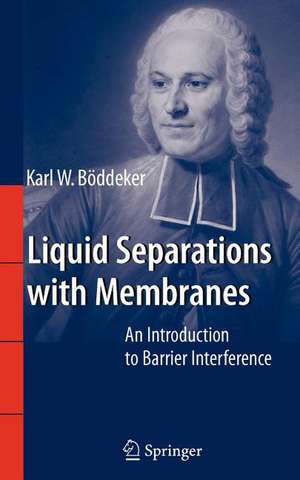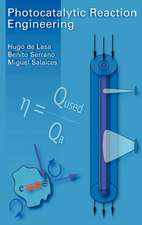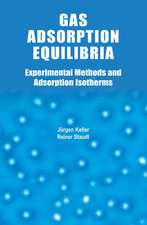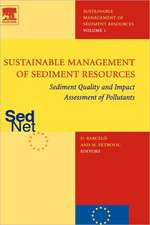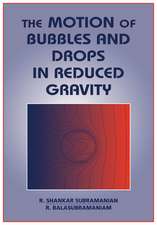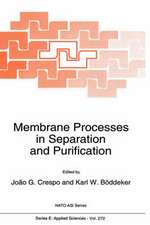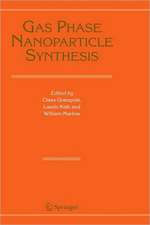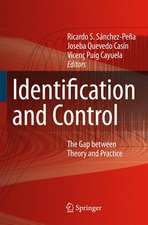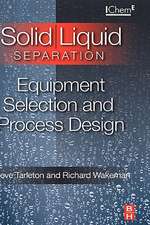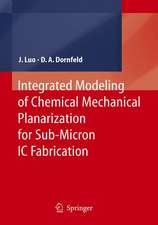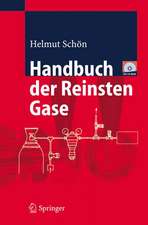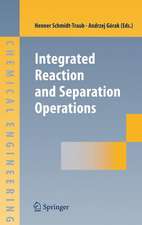Liquid Separations with Membranes: An Introduction to Barrier Interference
Autor Karl W. Böddekeren Limba Engleză Paperback – 24 noi 2010
| Toate formatele și edițiile | Preț | Express |
|---|---|---|
| Paperback (1) | 476.13 lei 38-44 zile | |
| Springer – 24 noi 2010 | 476.13 lei 38-44 zile | |
| Hardback (2) | 635.96 lei 6-8 săpt. | |
| Springer Berlin, Heidelberg – 11 dec 2007 | 635.96 lei 6-8 săpt. | |
| Springer International Publishing – 14 ian 2019 | 639.25 lei 6-8 săpt. |
Preț: 476.13 lei
Preț vechi: 595.16 lei
-20% Nou
Puncte Express: 714
Preț estimativ în valută:
91.12€ • 94.13$ • 75.83£
91.12€ • 94.13$ • 75.83£
Carte tipărită la comandă
Livrare economică 21-27 martie
Preluare comenzi: 021 569.72.76
Specificații
ISBN-13: 9783642079979
ISBN-10: 3642079970
Pagini: 164
Dimensiuni: 133 x 205 x 9 mm
Greutate: 0.17 kg
Ediția:Softcover reprint of hardcover 1st ed. 2008
Editura: Springer
Colecția Springer
Locul publicării:Berlin, Heidelberg, Germany
ISBN-10: 3642079970
Pagini: 164
Dimensiuni: 133 x 205 x 9 mm
Greutate: 0.17 kg
Ediția:Softcover reprint of hardcover 1st ed. 2008
Editura: Springer
Colecția Springer
Locul publicării:Berlin, Heidelberg, Germany
Public țintă
ResearchDescriere
On
the
level
of
a
textbook
a
self-consistent
approach
to
liquid
separations
with
membranes
is
presented,
contrasting
equilibrium
separations
with
the
rate-controlling
effects
of
barrier
interference
on
mass
transfer.
As
a
corollary
objective,
an
effort
is
made
to
observe
context,
factual
and
historical,
when
introducing
concepts
and
applications
of
membrane
separation
science.
Ordering
principle
is
the
formal
structure
of
mass
transfer
across
permeable
barriers,
being
construed
of
adriving
force(allocated
to
the
condition
of
the
mixtures
to
be
separated)
and
abarrier
permeability(holding
the
keys
to
membrane
selectivity).
The
membranes,
by
this
approach,
appear
by
way
of
the
mass
transport
requirements which
they
are
to
meet,
or
else
by
way
of
the
separation
effects
which
they
inspire.
Exploiting
barrier interference
is
the
challenge
of
membrane
separation
science
and
technology.
This
book
is
about
the
principles
behind.
Cuprins
An
Introduction
to
Barrier
Separation.-
The
Thermodynamic
Connection.-
Osmosis
et
cetera.-
Membrane
Filtration.-
Pervaporation
versus
Evaporation.-
What
Membranes
are
About.-
Tracing
Membrane
Science,
an
Historical
Account.
Recenzii
From
the
reviews:
"This work is … a little gem. Böddeker (Technische Universität Hamburg, Germany) describes the physical principles involved in a number of membrane separation techniques including osmosis, reverse osmosis, ultrafiltration, and pervaporation. … The appendixes are particularly helpful, providing useful reference tables and electron micrographs. … this is an excellent book for advanced students and professionals interested in understanding more about membrane separations. Summing Up: Highly recommended. Upper-division undergraduates through professionals." (J. M. Tomich, CHOICE, Vol. 45 (11), July, 2008)
"This work is … a little gem. Böddeker (Technische Universität Hamburg, Germany) describes the physical principles involved in a number of membrane separation techniques including osmosis, reverse osmosis, ultrafiltration, and pervaporation. … The appendixes are particularly helpful, providing useful reference tables and electron micrographs. … this is an excellent book for advanced students and professionals interested in understanding more about membrane separations. Summing Up: Highly recommended. Upper-division undergraduates through professionals." (J. M. Tomich, CHOICE, Vol. 45 (11), July, 2008)
Notă biografică
Karl
W.
Böddeker
became
Professor
at
Technical
University
Hamburg
(TUHH)
while
he
already
was
well
known
as
an
expert
on
desalination
and
pervaporation
in
the
scientific
community,
both
in
EMS
and
NAMS.
He
retired
from
GKSS
Research in
2005
but
is
still
active
as
lecturer
at
TUHH.
He
served
as
an
editor
for
the
Journal
of
Membrane
Science
and
still
is
an
active
editor
for
Membrane
News,
the
quarterly
newsletter
of
the
European
Membrane
Society
(EMS).
Textul de pe ultima copertă
On
the
level
of
a
textbook
a
self-consistent
approach
to
liquid
separations
with
membranes
is
presented,
contrasting
equilibrium
separations
with
the
rate-controlling
effects
of
barrier
interference
on
mass
transfer.
As
a
corollary
objective,
an
effort
is
made
to
observe
context,
factual
and
historical,
when
introducing
concepts
and
applications
of
membrane
separation
science.
Ordering
principle
is
the
formal
structure
of
mass
transfer
across
barriers,
being
construed
of
a
driving
force
(allocated
to
the
condition
of
the
mixtures
to
be
separated)
and
a
barrier
permeability
(holding
the
keys
to
membrane
selectivity).
The
membranes,
by
this
approach,
appear
by
way
of
the
mass
transport
demands
which
they
are
to
meet,
or
else
by
way
of
the
separation
effects
which
they
inspire.
Learning
by
principles
and
context
–
exploiting
barrier
interference
is
the
challenge
of
membrane
separation
science
and
technology.
This
book
is
about
the
principles
behind.
Caracteristici
Exploiting
barrier
interference
is
the
challenge
of
membrane
separation
science
and
technology
This book is about the principles behind
Provides expert knowledge as an survey, in systematic order, of the terms and concepts by which barrier separations operate, and through which practical membrane separation processes are designed
This book is about the principles behind
Provides expert knowledge as an survey, in systematic order, of the terms and concepts by which barrier separations operate, and through which practical membrane separation processes are designed
